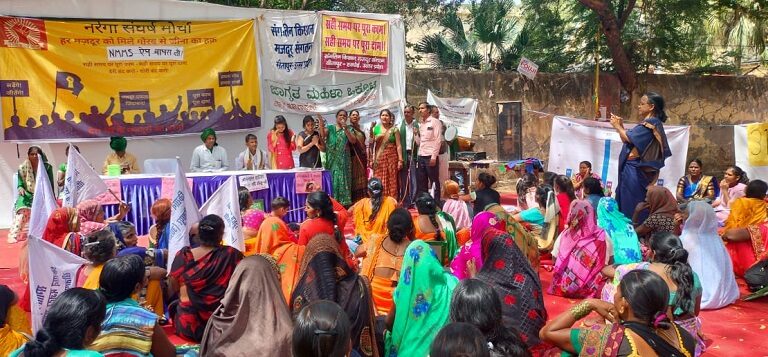‘Operational Problems’ In MGNREGA App: Cong Hits Out At Centre
Jul 17, 2025 | Pratirodh Bureau
The MGNREGA is a government scheme implemented in 2006 which ensures livelihood security in rural India by providing guaranteed employment for 100 days a year for at least one adult of every household
The Congress party has criticized the Narendra Modi government for the “operational problems” associated with the National Mobile Monitoring System (NMMS) application used in the Mahatma Gandhi National Rural Employment Guarantee Act (MGNREGA) for digital verification of attendance and work. Congress demanded the immediate withdrawal of what they termed an “unworkable” and “counterproductive” model.
Jairam Ramesh, Congress general secretary in charge of communications, stated, “FAST is the self-declared motto of the Modi government, and it actually stands for – ‘First Announce Second Think.'” He emphasized that since the introduction of the NMMS app in May 2022, the Congress party has consistently highlighted the operational issues that have arisen, arguing that these problems undermine the very essence of MGNREGA.
Ramesh pointed out that a notification issued by the Union Ministry of Rural Development on July 8, 2025, acknowledged the various issues associated with the NMMS. He remarked, “It was clear from the beginning that uploading photographs from NREGA worksites would end up excluding genuine workers whose photos could not be uploaded due to connectivity issues.” This acknowledgment, however, did not alleviate the concerns raised by Congress regarding the effectiveness of the NMMS.
He further criticized the NMMS for its inability to prevent “fake workers” from appearing on muster rolls. “Fake workers can go twice a day to be photographed, get paid without working for a minute,” he noted, highlighting the flaws in the system. Ramesh added, “What has come to light—fake and random photos being uploaded—only demonstrates the absolute uselessness of the NMMS.”
Despite recognizing the issues, Ramesh argued that the Modi government has proposed solutions that are “worse than the problem.” The latest order mandates that NMMS photos be verified physically by officers in charge, which Ramesh believes will waste the valuable time of NREGA functionaries. “Either they can verify photos, as is being mandated by the latest order, or they can perform their regular duties,” he contended.
Ramesh reiterated that the Congress party has consistently called for significant changes in the implementation of MGNREGA by the Union government. He noted that the Parliamentary Standing Committee for Rural Development and Panchayati Raj has echoed these demands, including the immediate withdrawal of the NMMS model based on photo uploads. He emphasized the need to reaffirm task-based payments, which he described as the “essence of MGNREGA.”
In light of the ongoing crisis of stagnant wages, Ramesh asserted that increasing MGNREGA wages is of paramount importance. “MGNREGA wages must rise to reach Rs 400 per day,” he declared, underscoring the urgency of this issue. He also criticized the proposal to make the Aadhar Based Payment Bridge Systems (ABPS) mandatory, stating that it should not be enforced.
Additionally, Ramesh called for wages to be paid within the statutory period of 15 days, insisting that any delays in payment must be compensated. He referenced a report tabled by the Parliamentary Standing Committee on Rural Development and Panchayati Raj in April 2025, which recommended increasing the number of workdays under the scheme from 100 to 150 and raising wages to at least Rs 400 per day.
The committee has expressed ongoing concern over the stagnation in funding for this flagship rural employment scheme and has stressed the importance of social audits to ensure proper implementation. Ramesh’s statements reflect a broader call for reform and accountability within the MGNREGA framework, emphasizing the need for a system that genuinely supports rural workers.
